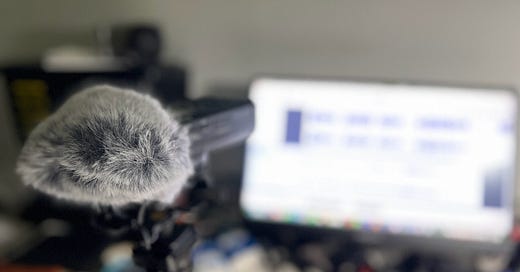What I learned writing a short essay in French
Writing in a second language presents its own unique learning experience
A short essay, probably of interest primarily to others who enjoy and sometimes struggle with the challenges of learning languages.
I recently posted, in French, a very brief reflection on my morning walks, where observing my shadow revealed to me quite graphically how injuries or ageing has changed my gait (Le jour où mon ombre m’a parlé). It began as writing exercise—a private attempt at writing something in my second language that I wanted to be descriptive, reflective and thoughtful. Ultimately I thought I might share it, and the experience it described turned out to have been familiar to several readers.
From the start, writing an essay in French was more of a struggle than I anticipated. I did not want to simply formulate my thoughts in English then translate them mechanically into French, I wanted to express myself in French in a way that felt somewhat natural to me and would sound that way to others as well. Easier said than done, and I admit—the result reads somewhat like a literal translation of an English-language document. Indeed, at the point when I decided to create an English version of it, the ease of composing it in my mother language underscored to me just how anglophone-ish the way I express myself is, whether I’m speaking or writing French.
This was no astonishing revelation. I sometimes find when reading French that I encounter sentences or phrases that I need to linger over in order to genuinely comprehend them. Such sentences are, to me, typically not easy to translate—they need to be expressed differently to capture their intended meaning. I lack the native ability to write French that way, I suppose because my mother language somehow governs how I express myself, regardless of language.
While writing I found myself sometimes struggling over individual words, too, feeling unsure of the connotation of a word, or of the sound and nuance of a phrase. When does a throng of tourists crowding around a tourist site move from being une foule to being un attroupement ? What language should I choose to express that I observed an unfamiliar shadow moving in front of me? J’ai regardé devant moi sounds coldly functional, and doesn’t say exactly what I was looking at; j’ai baissé les yeux is more accurate and seems more poetic to me—but how does it sound to someone who has spoken French from birth? I cannot say. I found myself fussing with the language for several weeks, including the day before posting it. It turns out that a sense of insecurity was part of the experience, too.
Substack offers the possibility of providing a voiceover for written posts, which can then take on a new life in discrete podcast environments. I’ve taken advantage of this several times. However, doing so with a French language text was a new challenge and I was unsure about whether I’d ultimately use this feature. I’m not a native speaker, after all. But I decided to try, applying a technique borrowed from my experience as a musician—recording myself, reviewing the recording, then making improvements in subsequent readings. Thinking of actually issuing a voiceover turned the exercise into an intimidating challenge, but I learned some things from it.
I recorded no fewer than four takes, listening back to each one carefully before trying again. The first was dismaying. There were a couple spots where I mumbled incomprehensibly—places where a native French speaker might say that I “ate my words.” Some vowel sounds were just annoyingly wrong, especially the letter “o,” but others, too—it’s hard to suppress the roundness of my American speech. And my consonants lack the crisp articulation of many native speakers. But things did improve over the course of the separate recordings. Ultimately I decided, what the hell, and included the fourth take as a voiceover. (I’d be happy for any native French speaker’s thoughts on what it sounds like to them, and what should be improved.)
Reading and recording the text also reminded me of something I should have written about in my earlier essay on parallels between learning music and learning languages. One thing that musicians have to do is read ahead while performing a piece—you have to anticipate what lies ahead; there are several reasons for doing this, but think, for example, of the potential for disaster every time you need to turn the page. My impression is that readers do the same when they read aloud—they need to do so in order to give their speech appropriate expression and nuance, to turn the written word into something meaningful. We tend to do this unconsciously, I think, when reading aloud in our mother language. When I was recording, I fumbled whenever I failed to look sufficiently ahead and have the whole sentence in mind as I read it. I had to stop and repeat, correcting the way I was reading the text.
If you’ve studied a language you know what I mean, because you have inevitably sat in a classroom where beginning students read word-by-word, rather than phrase-by-phrase or sentence-by-sentence. It can be painful to listen to—a sequence of individually articulated words doesn’t sound like natural speech, even if it’s unavoidable at a certain stage of language learning.
I remain unsure of whether I’ll undertake any similar exercises in the future—at least out in the public on Substack. But I thought I’d write about the experience in case it might be useful in some way to other language learners. If you have any thoughts about it please let me know.
My brief story here …
Le jour où mon ombre m'a parlé
Vivre dans un climat tempéré tend à éliminer les excuses pour quitter l’appartement et faire de l’exercice en raison du temps médiocre. Depuis que j’ai déménagé à Nice, j’essaie de profiter du climat agréable pour faire plus de marche aérobique—mes « marches rapides, » comme je les appelle parfois en sortant…






I know exactly what you mean. I have gone back to learning and perfecting my French and it’s a challenge. Like writing in any language, the key is reading books/articles written by native speakers. Without even thinking about it, their style begins to inform yours but you have to deconstruct what you’ve read. Why this verb or this expression? How does it differ what I would have said? And try not to translate in your head. Set the mind in French and then write. Bonne chance!
First of all, congratulations on successfully completing this intimidating project, and having the courage to put it out there in the world. Your experience exemplifies the effective use of metacognitive skills: you have a sort of mental map of what French sounds like (both in sentence structure and pronunciation) and you're continually comparing your production to that map. You're also reflecting on your output, making changes, trying new strategies (like translating into English), and applying what you've learned. What a wonderful project to really force yourself to master French.